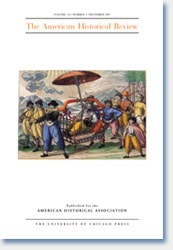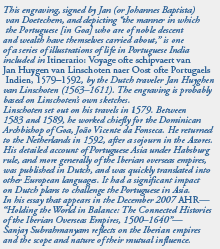Members will soon be receiving their copies of the December issue of the American Historical Review. Along with our extensive book review section and six featured reviews, this issue contains three articles, one “Exchange,” and an AHR Conversation on “Religious Identities and Violence.”

 As always, we strive to publish articles that represent the diversity of history as practiced today. For the most part the range of subjects and approaches is unplanned—that is, what we publish is largely determined by the serendipitous nature of the submissions we receive. In recent years, however, there has been a pronounced tendency in our pages toward articles that are transnational in scope. This is certainly true with the three articles in this issue. In “Holding the World in Balance: The Connected Histories of the Iberian Overseas Empires, 1500–1640,” Sanjay Subrahmanyam offers us an analysis of the Spanish and Portuguese empires that helped create a world-encircling empire for the Habsburgs between 1580 and 1640. His particular focus is on the interesting ways in which the somewhat blurred boundaries between these two empires were often unacknowledged by contemporaries and remain poorly understood by historians today. Philip Morgan, David Eltis, and David Richardson confront some well-established approaches to Atlantic history, focusing on the question of rice cultivation in the New World in their article, “Agency and Diaspora in Atlantic History: Reassessing the African Contribution to Rice Cultivation in the Americas.” (Their findings will be the subject of an “Exchange” in a future issue.) And in “Race, Racism, and Anti-Racism: UNESCO and the Politics of Presenting Science to a Postwar Public,” Michelle Brattain provides an interpretation of how the concept of race was reconstructed as a biological category through a history of an international, post-World War II, antiracist public education campaign sponsored by the United Nations Educational, Scientific and Cultural Organization. Finally, in an AHR “Exchange,” Eliga H. Gould and Jorge Canizares-Esguerra engage in a discussion about issues raised in the June issue’s Forum, “Entangled Empires in the Atlantic World.”
As always, we strive to publish articles that represent the diversity of history as practiced today. For the most part the range of subjects and approaches is unplanned—that is, what we publish is largely determined by the serendipitous nature of the submissions we receive. In recent years, however, there has been a pronounced tendency in our pages toward articles that are transnational in scope. This is certainly true with the three articles in this issue. In “Holding the World in Balance: The Connected Histories of the Iberian Overseas Empires, 1500–1640,” Sanjay Subrahmanyam offers us an analysis of the Spanish and Portuguese empires that helped create a world-encircling empire for the Habsburgs between 1580 and 1640. His particular focus is on the interesting ways in which the somewhat blurred boundaries between these two empires were often unacknowledged by contemporaries and remain poorly understood by historians today. Philip Morgan, David Eltis, and David Richardson confront some well-established approaches to Atlantic history, focusing on the question of rice cultivation in the New World in their article, “Agency and Diaspora in Atlantic History: Reassessing the African Contribution to Rice Cultivation in the Americas.” (Their findings will be the subject of an “Exchange” in a future issue.) And in “Race, Racism, and Anti-Racism: UNESCO and the Politics of Presenting Science to a Postwar Public,” Michelle Brattain provides an interpretation of how the concept of race was reconstructed as a biological category through a history of an international, post-World War II, antiracist public education campaign sponsored by the United Nations Educational, Scientific and Cultural Organization. Finally, in an AHR “Exchange,” Eliga H. Gould and Jorge Canizares-Esguerra engage in a discussion about issues raised in the June issue’s Forum, “Entangled Empires in the Atlantic World.”
The articles section of the issue concludes with an extended AHR Conversation on the topic, “Religious Identities and Violence.” The conversation, which began in June and concluded in October 2007, was conducted online and included six participants with a variety of interests and scholarly specialties. Philip Benedict writes about early modern Europe and especially Calvinism. Nora Berend is a medieval history scholar with a particular interest in southwestern Europe. Stephen Ellis is a historian of contemporary Africa. Jeffrey Kaplan studies religious fundamentalism, mostly in the United States. Ussama Makdisi writes on Arab and Ottoman history. Jack Miles has been a journalist and scholar covering a wide range of topics, mostly religious in nature.
The Featured Review section contains six reviews of books selected by the editors as worthy of this extended treatment. As I noted in a previous Perspectives article, we try very hard to choose books from a range of different subject areas, periods, and regions. In keeping with the intent of this journal over the last 15 years, we would very much like to avoid having the majority of reviews on books about modern Europe or the United States. Despite this goal, it might seem to some as if we are slighting scholarship by historians of areas outside the West. Nothing could be farther from the truth. We take care to evaluate all the books we receive to determine whether they are good candidates for the Featured Review section, and we solicit the views of the members of the Board of Editors when making our choices. But it is sometimes difficult to find appropriate books from certain fields. We would be very grateful, therefore, if readers took the time to alert us to books that should be reviewed in such a fashion, particularly if they are from underrepresented fields.



